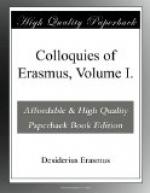Phaselus iste,
quem videtis, hospites,
Ait fuisse navium
celerrimus.
My Guests, that
Gally which you see
The most swift
of the Navy is, says he._
For so was this Verse in the old Edition. Those who write Commentaries on these Places being ignorant of this, must of Necessity err many Ways. Neither indeed can that which immediately follows be perspicuous in the Latin. [Greek: Kai ara eoti sigonta legein; ditton gar esti to sigonta legein, to te ton legonta sigan, kai to ta legomena.] That they have render’d thus; Et putas, est tacentem dicere? Duplex enim est, tacentem dicere; et hunc dicere tacentem, et quae dicuntur. Are not these Words more obscure than the Books of the Sibyls?
Hi. I am not satisfy’d with the Greek.
Le. I’ll interpret it as well as I can. Is it possible for a Man to speak while he is silent? This Interrogation has a two-Fold Sense, the one of which is false and absurd, and the other may be true; for it cannot possibly be that he who speaks, should not speak what he does speak; that is that he should be silent while he is speaking; but it is possible, that he who speaks may be silent of him who speaks. Although this Example falls into another Form that he adds a little after. And again, I admire, that a little after, in that kind of Ambiguity that arises from more Words conjoin’d, the Greeks have chang’d the Word Seculum into the Letters, [Greek: epistasthai ta grammata], seeing that the Latin Copies have it, scire seculum. For here arises a double Sense, either that the Age itself might know something, or that somebody might know the Age. But this is an easier Translation of it into [Greek: aiona] or [Greek: kosmon], than into [Greek: grammata]. For




